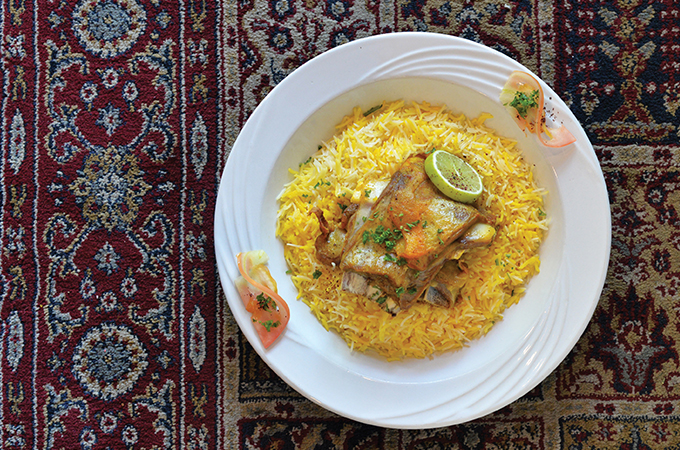This family restaurant tucked in the middle of Cherokee Street is charming. Opened by a Saudi family, you can tell they’ve taken great pains with the interior as well as the food. One wall is attractively covered in Middle Eastern patterned fabric, and a back room—impeccably clean and carpeted—is dotted with cushions for those preferring to eat family-style in the traditional way. But the best part of dining here is experiencing the owners’ pride in sharing their food customs.
Fedaa Alsadeq, who owns the restaurant with husband Osama Almoerfi, explains the nuances of her cuisine: cardamom, toasted almonds, raisins, fried onions, orange zest, turmeric and jute leaves. She says this is the only Saudi restaurant in St. Louis, and while there are some similarities between it and other Middle Eastern eateries, they are not the same. After a meal at Palm Trees, you’ll likely agree. The appetizer array will look familiar, but the items taste unique. Grape Leaves ($5.99) were among the best I’ve tasted, very small and tightly wrapped around rice, tomato and parsley. Olive oil and vinegar flavors were noticeable, but neither was overpowering. The Baba Ghanoush ($4.99) was very fresh and a bit chunky, served with delicately thin pita. The don’t-miss starter, however, is the Sambusa, either beef or veggie. The filled dough triangles are deep-fried without a hint of grease. Our veggie sambusas blended onions, carrots and other produce.
Lentil Soup ($4.99) is a delicious version of the classic. Slightly thick, it was a smooth blend of hearty lentils, pungent garlic, light cumin and sweet carrots with excellent Middle Eastern flavors. Also a bit different is the Falafel ($4.99), smaller than most with the slightest bit of spice. Its fried crust was thick and pleasingly crunchy. The accompanying tahini, however, was too thin for me. The only starter I didn’t admire was the Tabbouleh ($6.99), which tasted like little more than chopped parsley. Following halal laws, no pork is served here. Many of the dishes are offered in chicken or lamb versions, and we tasted both. Flavors often were mild, but interesting. The Mandi Lamb ($15.99) consisted of two pieces of on-the-bone meat sitting atop delightful basmati rice yellowed with spices. I suspect some menu descriptions aren’t completely accurate; it described the lamb as ‘grilled’ when I believe it was roasted. A garnish of raisins, almonds and fried onions added interest to the massive bed of rice. It was all quite good, but the portion of meat was small.
An order of Chicken Bukhari was fine, although the chicken was dry and bland. Conversely, the vegetarian Kushari ($10.99) was an attractive, appetizing plate of colorful layers: white macaroni shells, brown lentils, red tomato sauce, yellow chickpeas and blackened onions. The sauce was memorable with sweet, sour and savory flavors. The classic Kebabs are excellent here. You can have chicken or beef, each $11.99. The beef is the traditional shawarma ground meat, minced very fine, pleasingly laced with oil and herbs. The chicken version is tender, with flavorful, marinated white meat. Both come with turmeric-laced rice—although the grilled vegetables promised on the menu were not on the plate.
Do not miss dessert here; Alsadeq rightly assured us her offerings were not limited to the usual baklava found at other places. A hefty order of Om Ali ($5.40) offered a fascinating cross between bread pudding and custard. Delivered in a cast iron deep dish, it was creamy without being overly rich. Also good was Basbousa ($4.59), a large square of cornmeal cake drizzled with sweet liquid and topped with almonds.
amuse bouche
the scene | Friendly, family-run ethnic spot
the chef | Fedaa Alsadeq
the prices | $3.99-$5.99 appetizers, $8.99-$13.99 entrees
the favorites | Sambusa, Kabli Hijazi, Mandi Lamb, Kushari, Om Ali, Beef Kebab, Chicken Kebab, Basbousa
food • ŏ • lō • gy
halal
Refers to meat and poultry slaughtered according to Islamic law, which is similar to the Jewish laws of kashrut. It requires slaughter with a swift cut to the animal’s jugular vein, draining all blood before consumption.
cardamom
A spice from the seed pods of various ginger plants. Its fragrant and unusual flavor is used in Indian foods and Middle Eastern dishes.
jute leaves
Also known as Egyptian spinach, the leaves often are shredded and added to stews and soups in African and Middle Eastern dishes.
2837 cherokee st. | 314.226.9243
Photos: Bill Barrett








